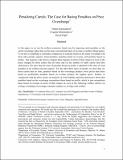Files in this item
Penalizing cartels : the case for basing penalties on the price overcharge
Item metadata
| dc.contributor.author | Katsoulacos, Yannis | |
| dc.contributor.author | Motchenkova, Evgenia | |
| dc.contributor.author | Ulph, David Tregear | |
| dc.date.accessioned | 2017-07-28T23:32:20Z | |
| dc.date.available | 2017-07-28T23:32:20Z | |
| dc.date.issued | 2015-09 | |
| dc.identifier | 152489827 | |
| dc.identifier | 2184216d-15c3-4df1-897e-71e8d59d8877 | |
| dc.identifier | 84939239769 | |
| dc.identifier | 000362058900007 | |
| dc.identifier.citation | Katsoulacos , Y , Motchenkova , E & Ulph , D T 2015 , ' Penalizing cartels : the case for basing penalties on the price overcharge ' , International Journal of Industrial Organization , vol. 42 , pp. 70-80 . https://doi.org/10.1016/j.ijindorg.2015.07.007 | en |
| dc.identifier.issn | 0167-7187 | |
| dc.identifier.other | ORCID: /0000-0003-3171-1270/work/59464518 | |
| dc.identifier.uri | https://hdl.handle.net/10023/11323 | |
| dc.description | Yannis Katsoulacos acknowledges that this research has been co-financed by the European Union (European Social Fund – ESF) and Greek national funds through the Operational Program "Education and Lifelong Learning" of the National Strategic Reference Framework (NSRF) - Research Funding Program: ARISTEIA – CoLEG. | en |
| dc.description.abstract | In this paper we set out the welfare economics based case for imposing cartel penalties on the cartel overcharge rather than on the more conventional bases of revenue or profits (illegal gains). To do this we undertake a systematic comparison of a penalty based on the cartel overcharge with three other penalty regimes: fixed penalties; penalties based on revenue, and penalties based on profits. Our analysis is the first to compare these regimes in terms of their impact on both (i) the prices charged by those cartels that do form; and (ii) the number of stable cartels that form (deterrence). We show that the class of penalties based on profits is identical to the class of fixed penalties in all welfare-relevant respects. For the other three types of penalty we show that, for those cartels that do form, penalties based on the overcharge produce lower prices than those based on profit)while penalties based on revenue produce the highest prices. Further, in conjunction with the above result, our analysis of cartel stability (and thus deterrence), shows that penalties based on the overcharge out-perform those based on profits, which in turn out-perform those based on revenue in terms of their impact on each of the following welfare criteria: (a) average overcharge; (b) average consumer surplus; (c) average total welfare. | |
| dc.format.extent | 46 | |
| dc.format.extent | 448027 | |
| dc.language.iso | eng | |
| dc.relation.ispartof | International Journal of Industrial Organization | en |
| dc.subject | Antitrust Enforcement | en |
| dc.subject | Antitrust Law | en |
| dc.subject | Cartel | en |
| dc.subject | Oligopoly | en |
| dc.subject | Repeated Games | en |
| dc.subject | HB Economic Theory | en |
| dc.subject.lcc | HB | en |
| dc.title | Penalizing cartels : the case for basing penalties on the price overcharge | en |
| dc.type | Journal article | en |
| dc.contributor.sponsor | Economic & Social Research Council | en |
| dc.contributor.institution | University of St Andrews. School of Economics and Finance | en |
| dc.identifier.doi | https://doi.org/10.1016/j.ijindorg.2015.07.007 | |
| dc.description.status | Peer reviewed | en |
| dc.date.embargoedUntil | 2017-07-28 | |
| dc.identifier.grantnumber | RES-062-23-2211 | en |
This item appears in the following Collection(s)
Items in the St Andrews Research Repository are protected by copyright, with all rights reserved, unless otherwise indicated.

